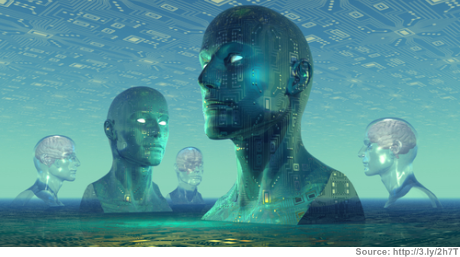Google CEO's social media warning; Impending information armageddon?

In an interview with the Wall Street Journal, Google CEO Eric Schmidt warns of the future consequences of social media and networks, and the vast amount of personal data that users put out there on the Web.
"I don't believe society understands what happens when everything is available, knowable and recorded by everyone all the time," he says. He predicts, apparently seriously, that every young person one day will be entitled automatically to change his or her name on reaching adulthood in order to disown youthful hijinks stored on their friends' social media sites.
"I mean we really have to think about these things as a society," he adds. "I'm not even talking about the really terrible stuff, terrorism and access to evil things," he says.
He even suggested that today's younger generation should consider changing their names in later life to escape their past online misgivings. That's hardly a means to an end. Surely proactively encouraging the education of online privacy instead of suggesting a deed poll on your graduation day?
This is something I have harped on about many of times before, and privacy watchdogs are constantly filling the news of data privacy awareness campaigns and asking those to consider the consequences of identity fraud and suchlike.
Who is to blame?
It boils down to (forgive the pun) the chicken or the egg. One could argue the point of who's fault it really is: the user for putting the information out there, or the search engines and social networks for collating the data and retaining it for vast periods of time.
The vast majority of Generation Y users will be at least somewhat aware that once something is on the Web, it cannot be taken down not for love nor money. But I can still Google my own name and find a cached copy of my cringeworthy MySpace profile from 2005 which frankly makes me want to gag with embarrassment.
Information as a commodity
Without melodrama or emphasis, exaggeration or overestimation, we are heading towards an 'Information Armageddon'.The world we live in today deals in information and data. Gold and platinum, diamonds and uranium; all useful and precious metals with great value and worth, and many have died and killed for. But the one universal currency that we use in this post-modern world is information.
We all have it. We all have our own specific, unique set of data and that makes us who we are. Our age, height, weight, name, location, feelings, emotions, thoughts and connections, all bundled together make a unique signature which makes us identifiable and singular in this world rapidly approaching 7 billion people.
The data we put online, more often than not it will be data that can easily be read and transcribed as text by computers, indexing and caching. This gives off enough data about ourselves as it is, but the data that can be extrapolated from a single photograph can be terrifying. Using simple mathematical equations, our height and weight can be measured by calculating distant landmarks with pre-existing data markers.
The privacy of the future US president
Twenty years from now, in and around the decade of 2030, the G8 superpowers of the world will hold national elections. The United States, the United Kingdom (we'll probably be a republic by then to be honest), Spain, France, Germany - the list goes on. New presidents and prime ministers will be put forward to the public vote.In other industries, my current generation will be of age to take on higher paid jobs with greater responsibility, professorships and directorships of major companies. They will be in the public eye and need to maintain communications as impartially and as credibly as they can.
I strongly suspect that our own social network content in particular will bide its time to risk sabotaging the future careers of all of the aforementioned and more. Think about it. A future president of the United States is probably in college right now with no clue that he (hopefully she) will be elevated to the White House in years to come.
But with photos of them under-age drinking, causing public nuisance or being snapped in a picture which could discredit their future selves; they won't think about that today, but they will most certainly know about it when the press jumps on it years down the line.
The past is there to haunt us. The past we are creating for ourselves in present day will follow us around like a dark shadow, threatening to expose a personal side of our future professional integrity that could ruin our careers.
It isn't a difficult concept to imagine, is it?
Reflecting on an 'open' generation
The BBC spoke to social media consultant, Suw Charman-Anderson who said, "As a society, we are just going have to become a bit more forgiving of the follies of youth".The misgivings of today's youth will no doubt be held in a different perspective in years to come. Everybody knows that the '60's was full of rebellion, drug taking and Andy Warhol tributes, and like many of my generation today, my parents were part of this widespread explosion of liberalisation of values. We look back without regret and accept it was a vital necessity to progress culturally after one of the bloodiest wars of the recent past.
And while Google signals a move towards social networking with rumoured 'Google.me' and the acquisition and investment in other social networks and gaming sectors, it would appear that these cautionary words from Schmidt indicate an empathetic understanding of the issues the Generation Y face in years to come.
But Google has had its fair share of privacy concerns just as major-player Facebook, with Google's Buzz application displaying publically visible Gmail addresses. And as the original interview says, the Google CEO knows "roughly who you are, roughly what you care about, roughly who your friends are".
Privacy is dead. Do you agree or disagree?